
CHINESE JOURNAL OF STRUCTURAL CHEMISTRY
metrics 2024
Bridging Theory and Application in Chemistry
Introduction
The CHINESE JOURNAL OF STRUCTURAL CHEMISTRY, published by Elsevier, stands as a vital resource in the field of structural chemistry, notably contributing to the advancement of knowledge since its inception in 1996. With its ISSN 0254-5861 and E-ISSN 0254-5861, the journal has established a firm reputation, garnering a Q2 ranking in the 2023 Chemistry (miscellaneous) category, which highlights its influence in the academic community (rank #155/408, 62nd percentile in Scopus). This journal serves as an invaluable platform for researchers and professionals by disseminating high-quality research findings, theoretical studies, and applied methodologies that address both fundamental aspects and emerging trends in structural chemistry. With contributions from distinguished scholars, it aims to foster innovation and collaboration, while providing a space for novel discoveries in the field. Although it does not currently offer Open Access, its robust content continues to attract a diverse readership eager to engage with cutting-edge scientific developments.
Metrics 2024
 0.56
0.56 5.90
5.90 2.10
2.10 28
28Metrics History
Rank 2024
Scopus
IF (Web Of Science)
JCI (Web Of Science)
Quartile History
Similar Journals

RUSSIAN JOURNAL OF INORGANIC CHEMISTRY
Fostering Insights for a Sustainable FutureThe Russian Journal of Inorganic Chemistry is a distinguished publication that delves into the fundamental and applied aspects of inorganic chemistry. Published by MAIK Nauka/Interperiodica/Springer, this journal has established itself as a vital resource for researchers, professionals, and students alike, contributing significantly to the fields of Inorganic Chemistry, Materials Science, and Physical and Theoretical Chemistry. With an ISSN of 0036-0236 and an E-ISSN of 1531-8613, the journal is indexed for easy access and citation. Though the journal currently operates under a subscription model, its commitment to disseminating high-quality research and fostering scientific discourse remains steadfast. The journal has been maintaining a consistent record since its inception, and its positioning in the Q3 quartile across various chemistry categories in 2023 underscores its relevance in the academic community. As it continues through its converged years from 1996 to 2024, the Russian Journal of Inorganic Chemistry plays a pivotal role in enhancing the understanding and advancement of inorganic chemistry, making it an indispensable tool for anyone engaged in this dynamic field.

CRYSTENGCOMM
Exploring the frontiers of crystal engineering and innovation.CRYSTENGCOMM is a distinguished journal published by the Royal Society of Chemistry, dedicated to advancing the field of crystallization and crystal engineering. With its impact factor consistently among the top tier in its category, CRYSTENGCOMM serves as an essential platform for researchers, professionals, and students in Chemistry, Condensed Matter Physics, and Materials Science. The journal has successfully maintained its relevance and influence since its inception, showcasing pioneering research from 1999 to 2024, with a commendable Q2 ranking in the latest evaluations. This accessibility to crucial developments in crystallization facilitates knowledge transfer across disciplines and enhances collaboration within the scientific community. Although it operates under a subscription model, the journal remains committed to disseminating cutting-edge research and fostering innovation in the field. For more information or to submit your research, please visit the Royal Society of Chemistry's website.
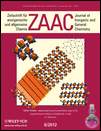
ZEITSCHRIFT FUR ANORGANISCHE UND ALLGEMEINE CHEMIE
Exploring the Depths of Inorganic ChemistryZEITSCHRIFT FUR ANORGANISCHE UND ALLGEMEINE CHEMIE, published by WILEY-V C H VERLAG GMBH, is a pivotal journal in the field of inorganic chemistry, catering to the needs of researchers, professionals, and students seeking to advance their understanding of this dynamic discipline. With its historical roots dating back to 1892 and a commitment to high-quality research, this journal provides a platform for the dissemination of significant findings related to inorganic substances and their general chemistry. Although currently not an open-access journal, it holds a competitive position with an impact factor placing it in the Q3 quartile of the Inorganic Chemistry category, ranking #57 out of 79 in Scopus. Situated in Germany, this journal not only connects past and present research endeavors but also aims to foster innovation and collaboration within the inorganic chemistry community. Whether you are exploring fundamental concepts or groundbreaking applications, ZEITSCHRIFT FUR ANORGANISCHE UND ALLGEMEINE CHEMIE remains an invaluable resource for advancing chemical sciences.
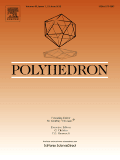
POLYHEDRON
Illuminating the Path of Polyhedral Chemistry.POLYHEDRON is a prestigious academic journal published by Pergamon-Elsevier Science Ltd, specializing in the fields of Inorganic Chemistry, Materials Chemistry, and Physical and Theoretical Chemistry. With its ISSN 0277-5387 and E-ISSN 1873-3719, the journal has been a significant outlet for groundbreaking research since its inception in 1982 and continues to be influential for scholars and practitioners. As of 2023, it holds a Q3 quartile ranking across its categorization, underscoring its impact within the scientific community with respectable Scopus Rankings that place it in the top percentiles of relevant fields. Situated in the United Kingdom, POLYHEDRON aims to foster the exchange of innovative ideas and findings related to polyhedral molecules and structures, making it an essential resource for researchers seeking to expand their knowledge and contribute to these dynamic areas of study. While currently not an Open Access journal, it remains committed to advancing education and research by providing quality content that serves both academic and practical applications.

REVUE ROUMAINE DE CHIMIE
Exploring New Frontiers in Chemical ScienceREVUE ROUMAINE DE CHIMIE is a distinguished academic journal in the field of chemistry, published by EDITURA ACAD ROMANE in Romania. With an ISSN of 0035-3930, this journal has been a valuable platform for disseminating original research and insights in the diverse realm of chemistry since its inception. The journal currently operates under a competitive tier, categorized in Q4 for miscellaneous chemistry fields, as reflected in its Scopus ranking of #348 out of 408, placing it within the 14th percentile. Aiming to foster scientific discourse and innovation, the REVUE ROUMAINE DE CHIMIE provides a repository of knowledge that is crucial for researchers, professionals, and students eager to advance their understanding and contribute to the global chemistry community. By bridging local and international research initiatives, this journal plays an essential role in enhancing the visibility of Romanian scientific contributions on the world stage.

ChemistrySelect
Unveiling the Future of Chemical DiscoveriesWelcome to ChemistrySelect, a pivotal journal in the field of chemistry published by WILEY-V C H VERLAG GMBH. With its ISSN 2365-6549, this journal aims to provide a comprehensive platform for researchers and practitioners to share significant advancements in various areas of chemistry, contributing to the ongoing dialogue and development within the scientific community. Since its inception in 2016, ChemistrySelect has focused on publishing high-quality research that spans multiple facets of the discipline, earning its place in the Q3 category for Chemistry (miscellaneous) as of 2023. While operating under a subscription model, the journal remains committed to broadening accessibility and engaging a wide audience of researchers, professionals, and students. The journal's objective is to facilitate the dissemination of groundbreaking findings through rigorous peer review, ensuring that the latest studies reflect the evolving nature of chemistry research. As we approach 2024, ChemistrySelect continues to be an invaluable resource for the academic community, positioning itself as a trusted voice in the world of chemical research.

Inorganic and Nano-Metal Chemistry
Advancing Knowledge in Inorganic Chemistry and Nanotechnology.Inorganic and Nano-Metal Chemistry is a premier journal published by Taylor & Francis Inc, focusing on innovative research and advancements in the fields of inorganic chemistry and nano-metal applications. With an increasing impact in the academic community, this journal has established itself within the Q3 category of both Inorganic Chemistry and Physical and Theoretical Chemistry as of 2023, reflecting its global recognition and influence. The journal is accessible as an Open Access publication, ensuring that research findings are freely available to a broad audience, promoting transparency and collaboration in scientific exploration. Based in the United Kingdom, Inorganic and Nano-Metal Chemistry aims to disseminate high-quality peer-reviewed articles that not only highlight fundamental studies but also push the boundaries of technological applications in areas such as catalysis, materials science, and nanotechnology. Researchers, professionals, and students will find this journal an invaluable resource for the latest developments and interdisciplinary insights in the ever-evolving landscape of inorganic and nano-metal chemistry.
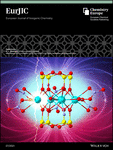
EUROPEAN JOURNAL OF INORGANIC CHEMISTRY
Pioneering Discoveries in Inorganic ScienceThe EUROPEAN JOURNAL OF INORGANIC CHEMISTRY, published by WILEY-V C H VERLAG GMBH, is a premier peer-reviewed journal dedicated to advancing the field of inorganic chemistry. With an ISSN of 1434-1948 and an E-ISSN of 1099-0682, this journal has established itself as a key platform for the dissemination of innovative research, reviews, and features since its inception. As of 2023, it holds a respectable Q2 quartile ranking in the domain of inorganic chemistry, reflecting its influence and contribution to the scientific community—ranking #33 out of 79 in Scopus’ assessment and placing the journal in the 58th percentile. The journal encompasses a wide range of topics within inorganic chemistry, making it a valuable resource for researchers, professionals, and students alike. Although the journal does not currently offer open access, it remains an essential outlet for high-quality, impactful studies in inorganic chemistry, showcasing significant advancements and fostering collaboration among scholars globally.
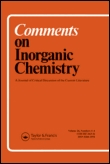
COMMENTS ON INORGANIC CHEMISTRY
Unveiling Innovations in Inorganic ResearchCOMMENTS ON INORGANIC CHEMISTRY is a prestigious academic journal published by Taylor & Francis Ltd, specializing in the dynamic field of inorganic chemistry. With an impressive impact factor placing it in the Q1 category, this journal ranks #6 out of 79 in its field, reflecting its high influence and contribution to the discipline, with a remarkable percentile ranking of 93rd. Since its inception in 1981 and spanning publications until 2024, this journal serves as a crucial platform for researchers, professionals, and students to disseminate groundbreaking findings, review articles, and discussions on contemporary topics in inorganic chemistry. Although it is not an Open Access journal, the rigorous peer-review process ensures the publication of high-quality research. By bridging theoretical and practical aspects of inorganic chemistry, COMMENTS ON INORGANIC CHEMISTRY remains an essential resource for advancing knowledge and fostering innovation within the scientific community.
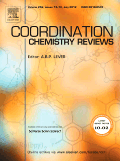
COORDINATION CHEMISTRY REVIEWS
Bridging Disciplines through Coordination ChemistryCOORDINATION CHEMISTRY REVIEWS is a premier academic journal published by ELSEVIER SCIENCE SA, specializing in the interdisciplinary field of coordination chemistry. Established in 1966 and running until 2025, the journal boasts an impressive reputation, having achieved Q1 quartile rankings in categories such as Inorganic Chemistry, Materials Chemistry, and Physical and Theoretical Chemistry. It holds a remarkable position in Scopus rankings, being ranked #1 in both Physical and Theoretical Chemistry and Inorganic Chemistry, indicating its significance within the field. With a focus on comprehensive reviews that synthesize existing knowledge and propose future research directions, COORDINATION CHEMISTRY REVIEWS serves as an invaluable resource for researchers, professionals, and students eager to stay at the forefront of coordination chemistry advancements. Although not open access, the journal is accessible through various academic institutions and libraries, ensuring that cutting-edge research is available to those who seek it.